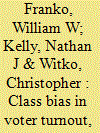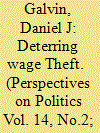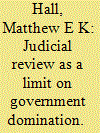|
|
|
Sort Order |
|
|
|
Items / Page
|
|
|
|
|
|
|
| Srl | Item |
| 1 |
ID:
146103


|
|
|
|
|
| Summary/Abstract |
The mass franchise led to more responsive government and a more equitable distribution of resources in the United States and other democracies. Recently in America, however, voter participation has been low and increasingly biased toward the wealthy. We investigate whether this electoral “class bias” shapes government ideology, the substance of economic policy, and distributional outcomes, thereby shedding light on both the old question of whether who votes matters and the newer question of how politics has contributed to growing income inequality. Because both lower and upper income groups try to use their resources to mobilize their supporters and demobilize their opponents, we argue that variation in class bias in turnout is a good indicator of the balance of power between upper and lower income groups. And because lower income voters favor more liberal governments and economic policies we expect that less class bias will be associated with these outcomes and a more equal income distribution. Our analysis of data from the U.S. states confirms that class bias matters for these outcomes.
|
|
|
|
|
|
|
|
|
|
|
|
|
|
|
|
| 2 |
ID:
146102


|
|
|
|
|
| Summary/Abstract |
Can stronger state-level public policies help protect workers from “wage theft?” In recent years, workers' rights groups have responded to policy drift and legislative inaction at the national level by launching campaigns to enact stronger penalties for wage and hour violations at the state level. Many of these campaigns have been legislatively successful and formative for the development of “alt-labor.” But are such policies actually effective in deterring wage theft? Previous scholarship has long concluded that although stronger penalties should theoretically make a difference, in practice, they do not. But by confining the analysis to the admittedly weak national-level regulatory regime, the existing literature has eliminated all variation from the costs side of the equation and overlooked the rich variety of employment laws that exist at the state level. Using an original dataset of state laws, new estimates of minimum wage violations, and difference-in-differences analyses of a dozen recently enacted “wage-theft laws,” I find that stronger penalties can, in fact, serve as an effective deterrent against wage theft, but the structure of the policy matters a great deal, as does its enforcement. The implications for workers' rights and the changing shape of the labor movement are discussed in detail.
|
|
|
|
|
|
|
|
|
|
|
|
|
|
|
|
| 3 |
ID:
146106


|
|
|
|
|
| Summary/Abstract |
In the wake of the Citizens United Supreme Court decision, many American private-sector employers now have the legal right to recruit their workers into politics and to fire or discipline employees who refuse to participate. How many firms and workers are engaged in this kind of political recruitment and why? And how have the opportunities for the political recruitment of workers by their employers changed over time? Drawing on national surveys of top corporate managers and workers, as well as a review of the legal literature, I provide initial answers to these questions and illustrate the implications of employer political recruitment for a range of substantive and normative issues in American politics. My findings invite further research and discussion about this feature of the American workplace and its effects on politics and policy.
|
|
|
|
|
|
|
|
|
|
|
|
|
|
|
|
| 4 |
ID:
146105


|
|
|
|
|
| Summary/Abstract |
For centuries, politicians, activists, and academics have criticized the American system of judicial review as democratically illegitimate. In response, dozens of scholars have striven to justify the institution’s place in a democratic political system. A compelling justification for judicial review must provide a realistic description of its function and a normatively attractive understanding of that function. Unfortunately, the most prominent justifications suffer from empirical or theoretical problems. However, recent empirical evidence suggests an “acquittal theory” that meets both criteria. On this view, courts armed with judicial review can thwart majority will by relieving individuals from government sanctions, but they lack the power to independently impose sanctions. This asymmetry suggests a resolution to the countermajoritarian difficulty that does not rely on judicial wisdom or behavior: the nature of judicial power ensures that judicial review reliably promotes a core democratic value—freedom from government domination—without seriously threatening other democratic values.
|
|
|
|
|
|
|
|
|
|
|
|
|
|
|
|
| 5 |
ID:
146108


|
|
|
|
|
| Summary/Abstract |
Do public engagement and political activism enhance or compromise the research enterprise of social scientists? I offer a personal reflection on the benefits and challenges of grounding scholarship about labor and workers’ political struggles in praxical engagement with labor activists, including with actual subjects of research. While scholars engage non-academic publics in many different ways, I underline how ongoing direct collaboration with labor activists can be facilitated by participation in campus organizations whose mission is labor-oriented research and education. My own involvement with the Harry Bridges Center for Labor Studies at the University of Washington provides one example of how this linkage between labor scholarship and labor activism can be sustained in routine, mostly complementary, and productive ways.
|
|
|
|
|
|
|
|
|
|
|
|
|
|
|
|
| 6 |
ID:
146107


|
|
|
|
|
| Summary/Abstract |
Crowdsourcing platforms offer a source of inexpensive data for research. At their fingertips, researchers have a round-the-clock workforce to fill out surveys, participate in experiments, and content-analyze text, among other tasks that generate social science data and help support research. Thanks to its low cost and convenience, crowdlabor has quickly and uncritically become a mainstream tool in our discipline. While such platforms have been evaluated on their aptness to generate high-quality data, surprisingly little has been said about the economic or political implications of their usage. Among other aspects, this article problematizes the “state of legal exception” in which crowdlabor markets operate, their tendency to rely on a pool of economically vulnerable workers and the asymmetrical employment relations they create. Rather than offer an easy solution, I aim to open up a conversation about this unique set of challenges in order to acknowledge and address them.
|
|
|
|
|
|
|
|
|
|
|
|
|
|
|
|
| 7 |
ID:
146104


|
|
|
|
|
| Summary/Abstract |
Contemporary political life takes place amid a “policyscape,” a landscape densely laden with policies created in the past that have themselves become established institutions, bearing consequences for governing operations, the policy agenda, and political behavior. Far from being static, policies often develop over time in ways that could not have been foreseen by their creators, due to dynamics they themselves generate, including design effects, unintended consequences, and lateral effects. Owing to such dynamics, existing policies require upkeep and maintenance if they are to continue to function well. The extent to which lawmakers engage effectively in such work varies, however, depending on the fit between the demands of the policyscape and the attributes of the historical political context. Bipartisan reform efforts occurred in many policy areas as recently as the early 1990s. More recently, partisan polarization and other developments have undermined such political capacity, leaving numerous policies untended for long periods and in many instances, even formal reauthorization long overdue. A cursory overview of policies associated with Americans’ top 20 policy priorities reveals that more than half are subject to deferred maintenance. The mismatch between the demands of the policyscape and the character of contemporary politics imperils effective democratic governance.
|
|
|
|
|
|
|
|
|
|
|
|
|
|
|
|
| 8 |
ID:
146101


|
|
|
|
|
| Summary/Abstract |
The right to strike is everywhere recognized but appears unjustifiable. Strikers refuse to work but they claim a right to the job. This sounds like illiberal privilege, or at least it cannot be a coercively enforceable claim. I argue, however, that the right to strike is justified as a way of resisting intertwined forms of structural and personal domination associated with the modern labor market. Workers are structurally dominated insofar as being forced to make a contract with some employer or another leaves them vulnerable to exploitation. They are personally dominated insofar as they are required to submit to the arbitrary authority of managers in the workplace, which deepens their potential exploitation. Strikes contest this domination by reversing the relationship of power. Workers can formally quit the job but they can’t quit work, so strikers quit working but don’t quit the job.
|
|
|
|
|
|
|
|
|
|
|
|
|
|
|
|
| 9 |
ID:
146109


|
|
|
|
|
| Summary/Abstract |
Higher education in the United States has proud roots in the mission to enable people to engage in self-governance. The current political context is pushing us in another direction. I discuss the context in Wisconsin in particular, and use the challenges there as a reason to consider the civic purposes of political science. Rather than allow the political winds to blow us further into elitism, I argue that we should renew our commitment to educating people for citizenship.
|
|
|
|
|
|
|
|
|
|
|
|
|
|
|
|
|
|
|
|
|